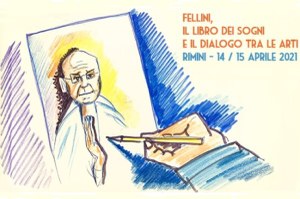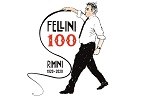Conference "The Book of Dreams and the dialogue among arts"
The Book of Dreams is a ‘diary’ Fellini has kept for about thirty years. On the advice of Jungian analyst Ernst Bernhard, he began to write down his dreams in form of drawings or, as in his own definition, “doodles, hasty and ungrammatical notes”.
It is made up of two volumes of different formats: the first, smaller, 25x35 centimetres of dimension and 245 pages, runs from November 30, 1960 to August 2, 1968; the second, 34x48 centimetres and 154 pages, runs from February 1973 to end of 1982. Some scattered pages and notes dated 1990 go with the two main books.
In 2003, The Book of Dreams was purchased by Emilia-Romagna Region which transferred it to Associazione Fondazione Fellini. Now the famous volumes are owned by the Municipality of Rimini (heir of the Association’s patrimony following its winding up in 2015) and, on the occasion of Fellini celebrations, it has promoted a new edition of the book curated by Mondadori/Electa.
The volume and its countless suggestions are the focal point of the conference "Fellini. Il Libro dei sogni e il dialogo tra le arti" (Fellini. The Book of Dreams and the dialogue among arts), organized by Cineteca del Comune di Rimini in collaboration with the University of Bologna and the Department for Life Quality Studies of Rimini Campus. The conference takes place live streaming on April 14 and 15 and will then be available on the Cineteca di Rimini YouTube channel.
During the two days of study and research with Roy Menarini (University of Bologna) and other specialists from the main Italian Universities, plus a keynote by Frank Burke, Professor Emeritus at Queen’s University Department of Film and Media, The Book of Dreams – this immense warehouse of stories, faces, hypothesis, fantasies, precognitions, and much more – will be analysed and discussed in speeches related to its different aspects but it will also provide cues for the definition of Fellini’s poetics and the examination of figures, themes, icons, quotes, places of Fellini’s films.
On the eve of the new international museum dedicated to Fellini, the conference aims at investigating if the book of Fellini’s cinema may be metaphorically and literally “re-opened” to confirm some branches of study and introduce new lines of research.


